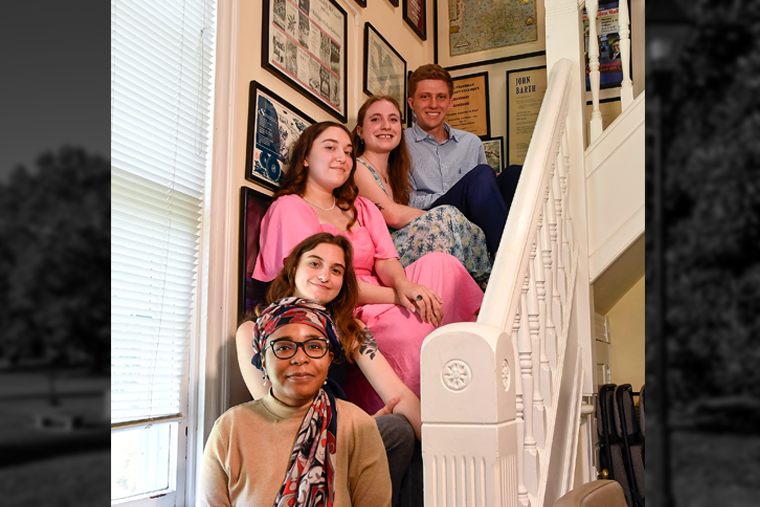Washington College Names Finalists for Nation’s Largest Undergraduate Writing Prize
Washington College has named the students on its short list for the Sophie Kerr Prize, the nation’s largest literary award for a college student, valued at nearly $80,000 this year. The winner will be announced at a ceremony this Friday, May 19 after the finalists all read from their work.

The 2023 Sophie Kerr Prize Finalists, from front to back: Queen Cornish, Amara Sorosiak, Eylie Sasajima, Sophia Rooks, and A.J. Gerardi.
Four of this year's five finalists submitted portfolios with several pieces for consideration, and the fifth submitted a 96-page play, an adaptation she wrote of John Gardner's Grendel. While all of them are writers, the students have varied involvement across campus, including as a varsity athlete, a podcast host, editors of the College's student-run journal, Collegian, and a student who has conducted several ethnographic research projects during their time at Washington.
Elizabeth O'Connor, associate professor of English and acting chair of the English department, announced the five graduating seniors who are finalists for this year's prize: Queen Cornish of Wilmington, Delaware; A.J. Gerardi from Wayne, Pennsylvania; Sophia Rooks of Williamsburg, Virginia; Eylie Sasajima of Spring Grove, Pennsylvania; and Amara Sorosiak from New Milford, Connecticut.
“The finalists demonstrate Washington College's longstanding strengths as a unique community for the literary and creative arts that also fosters critical thinking and writing across all disciplines. The writers represent areas of study that include English, creative writing, journalism, editing & publishing, theatre, anthropology, and environmental studies,” O'Connor said. “The committee was particularly impressed by the range of work submitted in the portfolios: poetry, short fiction, excerpts from novels, essays and creative nonfiction, an entire play, oral history and ethnography, and even a graphic novel. In reading through these portfolios, we all were struck by the expansive vision of literary production that emerges from the minds, hearts, and hands of these young writers.”
The Sophie Kerr Prize is named for an early 20th century writer from the Eastern Shore of Maryland who left a generous bequest to Washington College with the stipulation that half of its annual proceeds would fund a literary prize for a student. The other support made possible by Sophie Kerr's gift funds visiting scholars and writers, scholarships for promising students, library books, internships, and research, all in the fields of literature, writing, and publishing.
The prize is awarded each year to the graduating senior who has the best ability and promise for future fulfillment in the field of literary endeavor. In the past, the prize has been awarded for both creative and critical writing alike. Student winners are chosen for their literary excellence, regardless of genre. The portfolio students submit for consideration for the Sophie Kerr Prize typically includes the full range of writing that students pursue at Washington College, including fiction, poetry, creative nonfiction, screenplays and drama, journalism, editing, scholarly criticism and research in all disciplines, and even song lyrics.
Watch Friday night's ceremony live on YouTube, starting at 7:30 p.m., or attend the celebration in Hotchkiss Recital Hall.
Founded in 1782, Washington College is the nation's first liberal arts institution and the 10th oldest college in the nation. Enrolling approximately 1,000 undergraduates from more than 35 states and a dozen nations, Washington is known for outstanding academics with an emphasis on hands-on, experiential learning across more than 40 multidisciplinary areas of study. The College is home to nationally recognized academic centers in history, writing and the environment. In addition to its main campus in Chestertown, Maryland, Washington also features a riverfront campus and a 5,000-acre river and field campus that provides unique research opportunities for students and faculty.